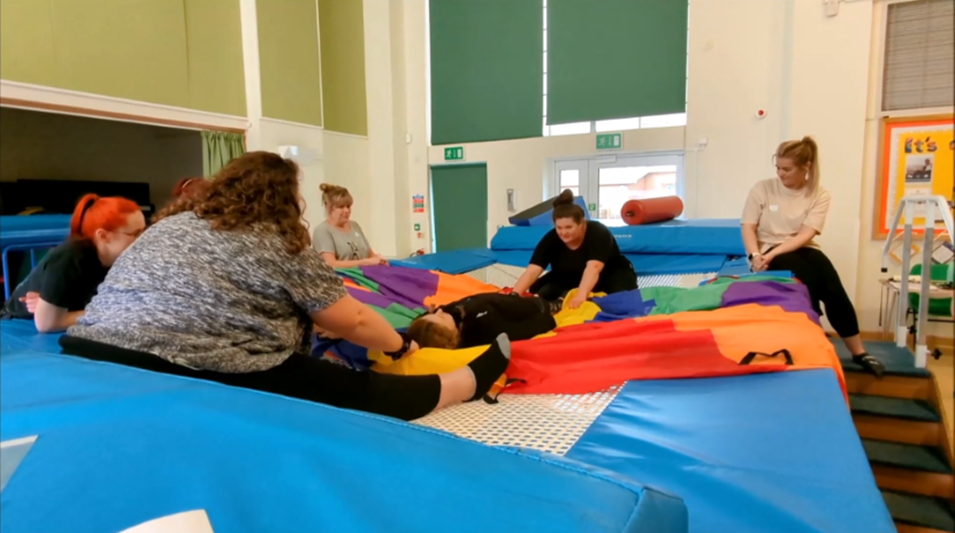Sensory & Physical
Sensory needs are considered whether this be adaptations to the classroom area for those who don’t like too much noise, to sensory programmes in place for pupils who need to have their sensory processing skills developing or need opportunities for self-regulation through sensory diets. Opportunities are provided for the development of fine and gross motor skills and appropriate supportive equipment provided for those that need it.
Physical needs are met by the Physiotherapy team over seeing and working closely with class staff who carry out any physical management needs of the pupils.
There is close working with the Derby Specialist Teaching and Psychology Service (STePS) in particularly the Hearing Impairment and Visual Impairment teams, who make sure pupil’s needs are met appropriately.
Move
The MOVE Programme is an activity-based practice that enables our learners to gain independent movement. It uses the combined approach of education, therapy and family knowledge to teach the skills of sitting, standing, walking and transitioning between. The aim of the MOVE Programme is to offer these movement opportunities to disabled people, opening up and transforming the world around them and creating an accessible, interesting and educational world full of opportunity and choice.
The programme’s central philosophy is that movement is the foundation for learning. In early development, children learn about their environment and gain skills to navigate the world by moving, exploring, and practicing repeatedly. A disabled child who uses assistive equipment and relies on others for much of their movement is generally provided fewer opportunities to independently move and learn. The MOVE Programme ensures that disabled young people are provided these vital opportunities to develop their mobility and independence.
Sensory Diets
Our pupils have a range of sensory and perceptual impairments, which is why we focus on all seven senses of sight (visual), sound (auditory), touch (tactile), taste (gustatory), and smell (olfactory) as well as the kinaesthetic proprioceptive (where they are in space) and vestibular (movement) senses.
The school employs an Occupational Therapist, specialising in a sensory integration approach, who works with our pupils as required to support with a range of sensory needs and to produce a Sensory diet that can be implemented in school and at home. They will also work with key staff and families in ways to deliver Sensory diets for the pupils who need to regulate themselves in order to engage fully in the school day. The majority of pupils access some form of physical activity first thing in the morning on arrival, sensory walks, sensory circuits and bespoke videos containing Gross motor skills to follow in class.
Rebound Therapy

Rebound Therapy is the therapeutic use of a Trampoline to promote and develop motor skills, body awareness, balance, co-ordination and communication. Rebound Therapy should be seen as an integrated part of your child’s movement programme if appropriate. Rebound Therapy has a unique effect on the body organs, systems and muscles.
Rebound Therapy:
- Aids movement
- Promotes balance
- Promotes an increase or a decrease in muscle tone
- Promotes relaxation
- Promotes sensory integration
- Improves communication skills!
- Improves fitness and exercise tolerance
It’s a fantastic opportunity for your child to have quality 1:1 or 2:1 time out of the classroom environment. Your child will have their own personalised targets and will always have someone who knows them well to support them.
Sensory Room
Pupils all benefit from accessing the sensory room to enhance their learning. It is used to immerse pupils in a sensory experience with interactive equipment on the walls and floors and enhanced with music and props to stimulate sessions. Pupils will be using their tracking skills, listening skills, reaching, pressing and controlling skills. Pupils will often have a change of position in this room to support their physical management needs.
Fine Motor Skills
Fine motor activities provide pupils, who are able, with the opportunity to hold, manipulate and play to promote and develop their Fine Motor skills. The maintenance and promotion of these skills will help the pupils in all that they do in school and at home as FMS are a very valuable part of everyday life
‘Fine motor skills are those that involve a refined use of the small muscles which control the hand, fingers and thumb. With the development of these skills, a child is able to complete important tasks such as writing, feeding oneself, buttoning and zippering. ‘Little hands need to develop dexterity and strength ‘.

